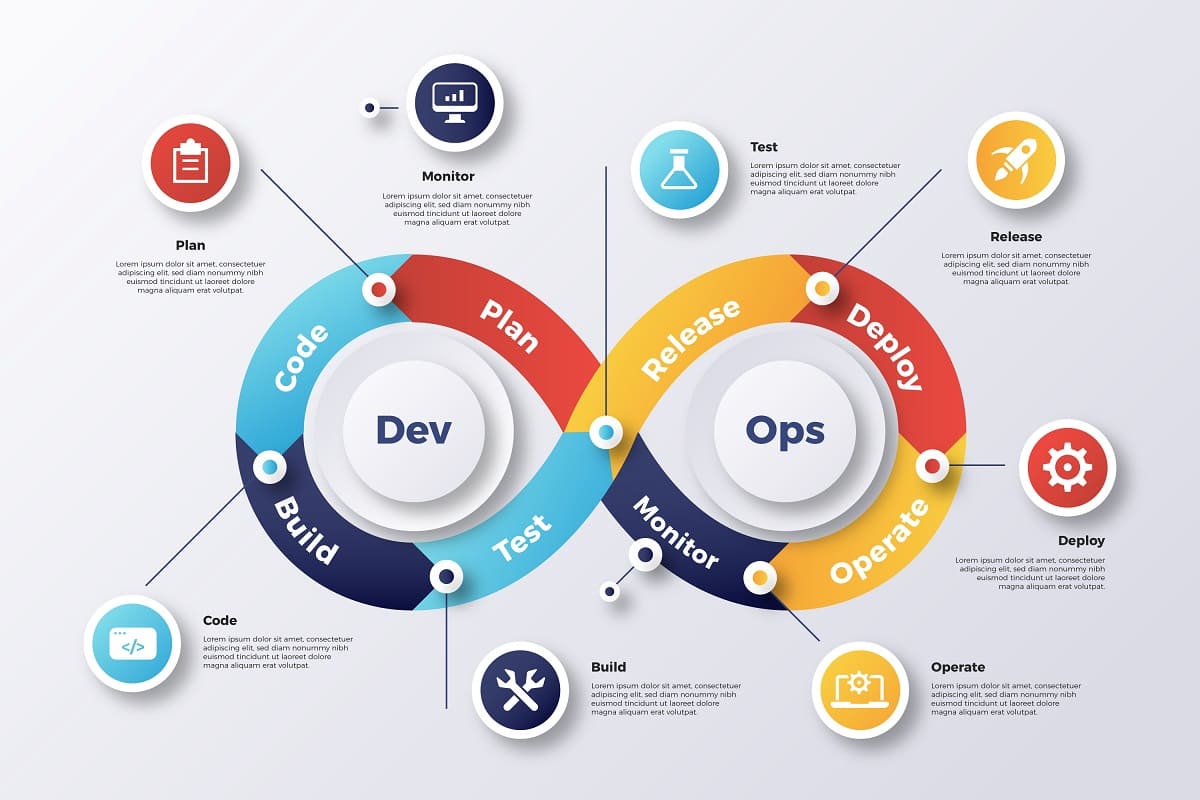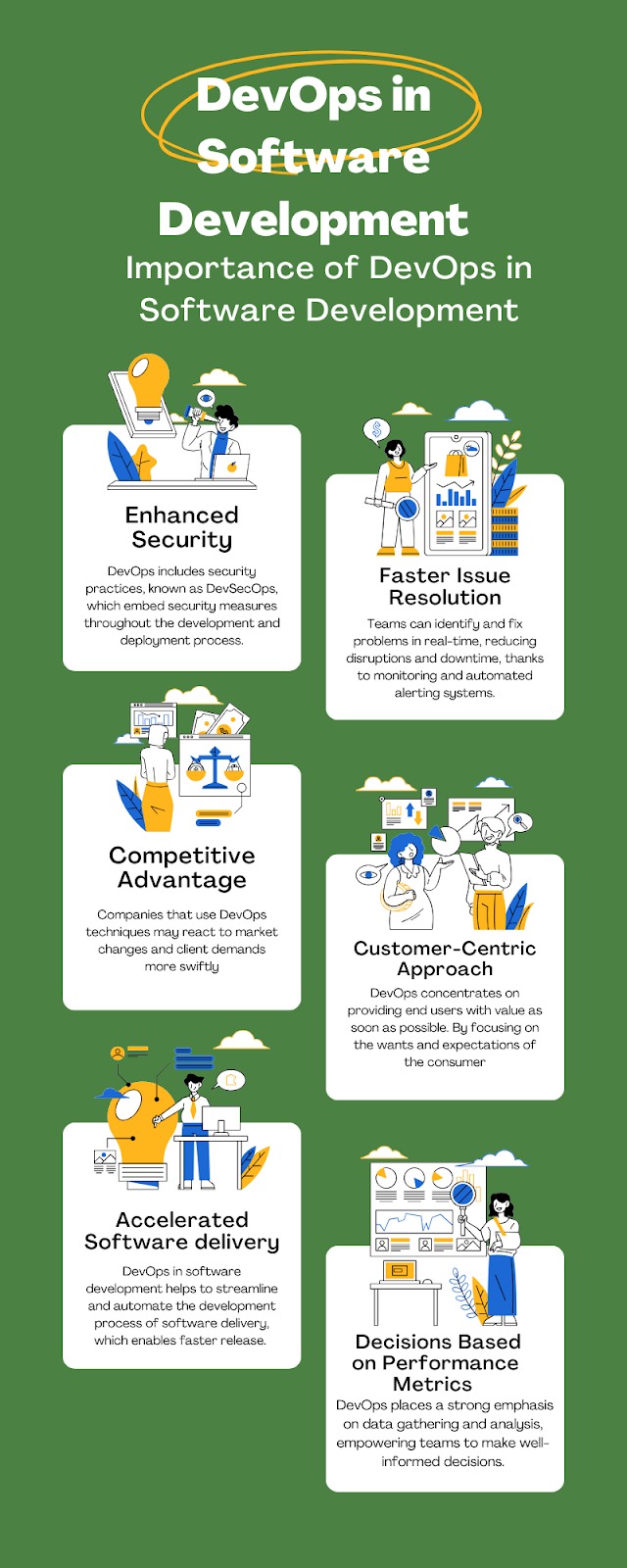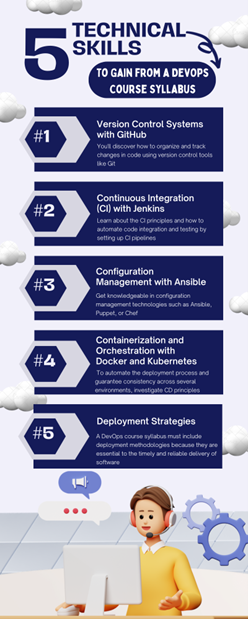What Technical Skills Can You Expect To Gain From a DevOps Course Syllabus?
Ever wondered if a DevOP course could help improve your technical skills? If not, then check this post to learn its wonderful applications.
Join the DZone community and get the full member experience.
Join For FreeAre you thinking of going for a DevOps Course but don't know the technical skills you can gain from this course?
DevOps course covers a lot of information when it comes to technical skills.
This course aims to help streamline and bridge the gap between software development and IT operations.
In this article, I will be uncovering the technical skills you can gain from a DevOps Course Syllabus.
Definition of DevOps

Ever wonder how your favorite apps and websites run so smoothly? Well, there's a secret sauce in the world of software development, and it's called DevOps.
DevOps is a methodology in the software industry.
It is the combination of various practices, tools, principles, and cultural philosophies aimed at the integration and automation of the work of software and IT industries.
In essence, one can say that DevOps helps to enable the smooth running, automation, and development of software applications.
What Is a DevOps Course?
It is an educational program aimed to train and teach individuals who wish to gain knowledge on the principles, practices, tools, and techniques associated with development and operations in the field of IT operation and software development.
This course covers essential technical skills and knowledge needed to set you up in the field of development and operations.
There are several skills you can gain from this course.
Importance of DevOps in Software Development
DevOps plays a crucial role in modern software development.
It is incredibly important in the world of software development and IT operations for several key reasons, as also shown in the infographic below:

- Enhanced security: DevOps includes security practices, known as DevSecOps, which embed security measures throughout the development and deployment process. This proactive approach mitigates security risks and vulnerabilities.
- Reduced downtime: The ability to roll out updates and patches seamlessly with minimal downtime is a significant advantage of DevOps. This leads to improved system availability and customer satisfaction.
- Scalability and quality: Platforms like Docker and Kubernetes allows easy scaling of application to meet demands. This helps to ensure scalability, optimal resource utilization, and improved performance.
- Accelerated software delivery: DevOps in software development helps to streamline and automate the development process of software delivery, which enables faster release. With DevOps in software development, manual intervention and lead times are reduced.
- Customer-centric approach: DevOps concentrates on providing end users with value as soon as possible. By focusing on the wants and expectations of the consumer, software is made to meet those needs and expectations.
- Competitive advantage: Companies that use DevOps techniques may react to market changes and client demands more swiftly. In the quick-paced commercial climate of today, this agility may give an advantage.
- Making informed decisions based on performance metrics and user feedback: DevOps places a strong emphasis on data gathering and analysis, empowering teams to make well-informed decisions.
What Are the Main Components of DevOps?
DevOps is a comprehensive approach to software development and IT operations, and its success relies on several key components working together seamlessly.
From automation and collaboration to continuous integration and delivery, these components form the building blocks of DevOps, reshaping the way software is developed and delivered in the modern age.
So, let's start a journey to uncover the main components of DevOPs that make it a game-changer in the world of technology.
- Culture: DevOps places a strong emphasis on a transformation in the way development and operations teams interact, encouraging cooperation, shared accountability, and open dialogue. A DevOps culture places high importance on adaptability, ongoing learning, and customer value delivery.
- Automation: Automation is the most important component in a DevOps course syllabus. Automating repetitious operations like code integration, testing, deployment, and infrastructure provisioning entails the use of tools and scripts. Automation speeds up procedures, ensures uniformity, and lowers manual mistake rates.
- Continuous Integration: The process of routinely merging code changes into a shared repository is known as continuous integration or CI. To maintain code quality and find problems early in the development process, automated CI pipelines compile and test code changes.
- Microservices: Using a microservices architecture, big monolithic programs are divided into more manageable, standalone services. Microservice management is particularly suited to DevOps approaches, which enable quick development and deployment of individual services.
- Containerization: By enclosing applications and their dependencies, containers, like those controlled by Docker, make applications portable and consistent across many settings. Containerization streamlines scaling and deployment, advancing DevOps procedures.
- Orchestration: Managing, scaling, and deploying containers in a cluster is automated by solutions for container orchestration like Kubernetes. High availability, load balancing, and self-healing capabilities are all made possible through orchestration.
- Infrastructure as Code (IaC): is a technique for defining and supplying infrastructure that is more effective, repeatable, and versionable by utilizing code. IaC adoption is aided by tools like Terraform and AWS CloudFormation.
- Collaboration platforms: To enable information sharing, feedback, and team coordination, DevOps relies on collaboration and communication platforms like Slack, Microsoft Teams, or Atlassian solutions (Jira, Confluence).
- Version control: Git and other version control tools are crucial for managing and tracking changes to infrastructure and code. Collaboration, code reviews, and code history tracking are all made possible by version control.
- Container registry: To make container images available for deployment, container registries store and manage container images. Docker Hub and Amazon Elastic Container Registry (ECR) are two well-known container registries.
What Technical Skills Can You Expect To Gain From a DevOps Course?
A DevOps course typically covers a wide range of technical skills and tools to prepare individuals for roles in DevOps and related fields.
The specific skills you can expect to gain from a DevOps course may vary depending on the course content and duration, but here are some common technical skills and topics often included in a DevOps syllabus: 
- Understanding the DevOps Culture: For DevOps methods to be successfully implemented within a business, it is crucial to understand the DevOps culture. DevOps is more than simply processes and tools; it's also about cultivating a cooperative and agile mindset that prioritizes sharing accountability, open communication, and continuous development.
- Version Control Systems with Git and GitHub: You'll discover how to organize and track changes in code using version control tools like Git, facilitating collaboration and guaranteeing code integrity.
- Continuous Integration (CI) with Jenkins: Learn about the CI principles and how to automate code integration and testing by setting up CI pipelines with technologies like Jenkins, Travis CI, or CircleCI.
- Containerization and Orchestration with Docker and Kubernetes: To automate the deployment process and guarantee consistency across several environments, investigate CD principles and solutions like Docker and Kubernetes.
- Configuration Management with Ansible: To automate the setup and management of servers and applications, get knowledgeable in configuration management technologies such as Ansible or Puppet.
- Deployment Strategies: A DevOps course syllabus must include deployment automation methodologies because they are essential to the timely and reliable delivery of software. To select the most suitable deployment strategy for their applications and systems, DevOps professionals need to be familiar with the numerous deployment strategies.
Conclusion
Hence, a DevOps course equips individuals with a diverse set of technical skills and knowledge crucial for success in the ever-evolving world of software development and IT operations.
From mastering version control systems to automating deployment processes, managing infrastructure as code, and ensuring security, a well-rounded DevOps education empowers professionals to streamline workflows, enhance collaboration, and deliver high-quality software efficiently.
Ultimately, a DevOps education not only equips individuals with technical prowess but also instills a mindset of agility, adaptability, and a commitment to delivering value to users faster and more reliably.
In the dynamic world of technology, these skills and principles are invaluable assets for anyone pursuing a career in DevOps or related fields.
So, are you going to take on a DevOps course and extend your career to new heights?
Let me know in the comments.
Opinions expressed by DZone contributors are their own.

Comments